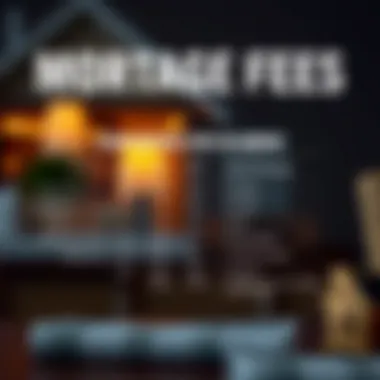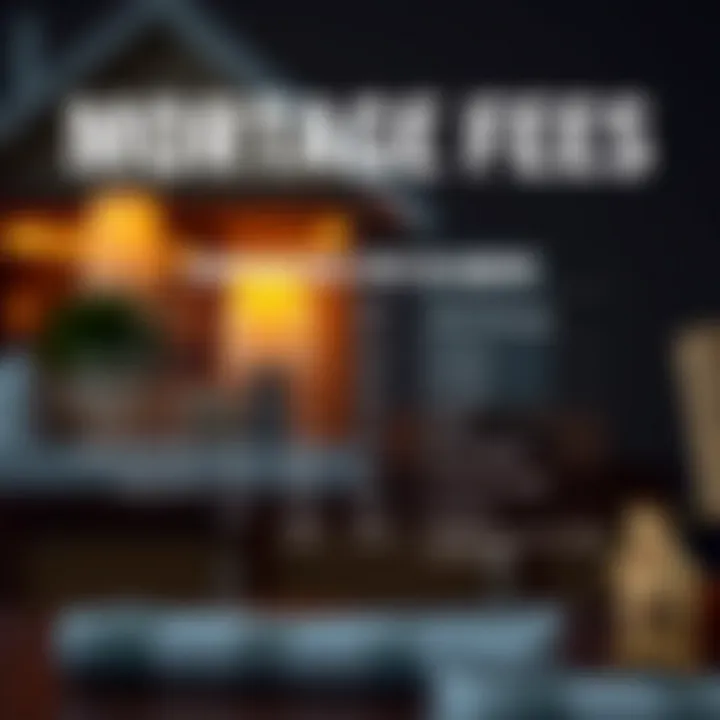Understanding the Financial Impact of a $140,000 Mortgage


Intro
When diving into the realm of home ownership, understanding costs is paramount, especially with a $140,000 mortgage. Mortgage costs can be as multifaceted as they are critical for both novice buyers and seasoned homeowners. Picture this: the price of your dream home looks enticing on paper, but what happens when you factor in the interest rates, additional fees, and loan terms? The financial landscape can quickly become a quagmire, leaving many to wonder if they are truly prepared for the long haul.
The following sections will distill this complex topic into manageable chunks, starting with an overview of what a mortgage really is and how it functions. From there, we will delve into the various types and categories of mortgages available, walking through the application process step-by-step. We’ll also break down the costs and hidden fees associated with securing that elusive home loan.
By the end of this article, you should have a firmer grasp on the financial commitment tied to a $140,000 mortgage, arming you with insights that will empower you to make informed decisions as you chart your path toward homeownership.
Overview of Mortgage Basics
Understanding how mortgages work is crucial, especially when embarking on the journey of purchasing a home with a hefty price tag like $140,000. It can be a daunting task trying to make sense of various elements, but don’t worry—this section breaks it down into bite-sized pieces.
A mortgage is fundamentally a loan used to buy real estate, and it’s secured by the property itself. This means if the borrower fails to repay the loan, the lender can take ownership of the property. This simple yet effective arrangement has allowed countless individuals to realize the dream of homeownership.
What is a Mortgage?
A mortgage isn't just a loan; it’s a long-term commitment to repay borrowed money, which usually comes with interest over a determined period, often referred to as the loan term. Mortgages are often a necessity for first-time buyers who don’t have the cash to buy property outright. The beauty of a mortgage lies in its structure—monthly payments that include principal and interest, which can make budgeting more manageable. Buyers should be mindful, though; understanding interest rates and terms can save them a lot in the long run.
Types of Mortgages
When it comes to mortgages, variety is the spice of life. Different types accommodate diverse financial situations and preferences, so it’s essential for potential homeowners to find the type that best suits their needs.
Fixed-Rate Mortgages
The fixed-rate mortgage is one of the most straightforward mortgage options available. As the name suggests, the interest rate remains constant throughout the life of the loan, typically ranging from 15 to 30 years. This feature provides stability against the fluctuations of the market. For many, knowing the monthly payment remains unchanged throughout the term offers peace of mind, especially when life throws curveballs.
The greatest aspect of fixed-rate mortgages is that the borrower isn’t at the mercy of rising interest rates. When the rate is locked in, it provides assurance that payments will not increase even if market rates soar. However, this can also be a double-edged sword; if rates drop, one can feel stuck with a higher payment unless refinancing is feasible, which might not always be the case.
Adjustable-Rate Mortgages
On the other hand, an adjustable-rate mortgage (ARM) presents a different flavor. With an ARM, the interest rate is lower initially but can fluctuate after an introductory period of fixed rates. While this may sound enticing because of initially lower payments, borrowers are also exposed to the risk of rising rates down the line.
For young professionals or those who don’t plan to stay in a home for an extended period, ARMs can be appealing as they allow for lower payments initially. However, potential buyers should tread carefully; they must understand the cap on rate increases and how those future adjustments could impact their finances.
Government-Backed Loans
Lastly, let’s not forget about government-backed loans, like FHA or VA loans, which cater to specific groups, such as veterans or low-to-moderate-income buyers. They typically come with favorable terms, like lower down payments and reduced interest rates, which can be quite appealing.
The beauty of these loans lies in the way they make homeownership more accessible, often bypassing stringent financial requirements that traditional loans might have. However, these loans may still require mortgage insurance, which can add to the overall cost, so it's wise for prospects to factor that in when calculating budgets and future payments.
This introductory section sheds light on the core principles that underpin the mortgage world, helping readers better navigate their financial decision-making journey.
Key Factors Influencing Mortgage Costs
When it comes to understanding the financial implications of a mortgage, several key factors play a significant role in determining the overall cost. These elements not only shape the monthly payments, but also influence the total amount you’ll pay over the life of the loan. Knowing how these factors work can help prospective homeowners make smarter financial choices when taking on a $140,000 mortgage.
Interest Rates
Current Market Trends


Interest rates have a profound effect on mortgage costs. They determine how much you’ll pay in interest over the life of your loan. Currently, the market sees a fluctuating landscape of rates influenced by economic indicators, inflation, and government monetary policies. A low-interest-rate environment can be particularly advantageous for borrowers, allowing them to lock in payments that won't break the bank. Conversely, even a minor uptick in interest rates can increase expenses significantly over time.
The main characteristic of current market trends is their unpredictability. For instance, a sudden economic downturn can lead to lower rates as central banks attempt to boost spending. In this context, securing a mortgage during such times can result in considerable savings. However, the downside might be tied up in the volatility of the market, making it essential for buyers to monitor trends closely.
Impact of Credit Score
Your credit score is another crucial player in the mortgage game. This three-digit number reflects your creditworthiness and can influence the interest rate you are offered. A higher credit score often translates to better rates, saving you money in the long run. Most lenders use a score above 740 as the benchmark for favorable interest rates. While having good credit can work to your advantage, the challenge lies in maintaining or improving that score. Factors such as payment history, credit utilization, and the length of your credit history all contribute to your overall score. Lowering your interest rate through a better credit profile can reduce monthly costs and total interest paid over time. So, working on improving one’s credit score before applying for a mortgage could be very wise.
Loan Amount
Principal and Interest Payments
The loan amount you take on significantly impacts your monthly mortgage costs. The principal is the initial sum borrowed, while interest is what the lender charges for lending that money. For a $140,000 mortgage, knowing how these two components interact can help gauge affordability. As a general rule, the larger the loan amount, the higher the interest payments—this is often a major consideration for buyers. One distinct feature of understanding principal and interest payments is that they interact on an amortization schedule. Initially, you pay more toward interest than principle in the early years, but as time goes by, this ratio flips. This gradual shift means that while you might start with lower equity in the home, you’ll build it over time as more payments go toward the principal.
Loan Term
Short-Term vs Long-Term Loans
Loan terms vary, with common options being 15 or 30 years. Each comes with its own set of benefits and drawbacks. Short-term loans tend to offer lower interest rates which could mean significant savings over time but come with higher monthly payments. In contrast, long-term loans make it easier to manage payments due to their lower monthly rate. These choices can be vital depending on your financial situation and future goals, influencing your overall mortgage costs. When deciding between these options, one should consider long-term financial goals as well. A short-term loan might sound appealing because of the lower interest, but if cash flow is tight, opting for a longer term could prove more manageable in the short run.
Property Taxes and Insurance
Property taxes and homeowners insurance are often overlooked but add a substantial amount to your monthly mortgage payment. These costs fluctuate based on your location and property value. It’s crucial to factor these into your budget beyond just the principal and interest.
Mortgage Insurance
For borrowers who outlay less than 20% as a down payment, private mortgage insurance (PMI) becomes a necessity. This can add extra costs to your monthly bills, making it essential to account for when budgeting your mortgage costs. Understanding the implications of PMI can assist in deciding how much you want to put down at the outset.
Calculating Monthly Payments
When it comes to managing a $140,000 mortgage, figuring out the monthly payments is crucial. These payments not only reflect what you owe on the loan but also encompass several other expenses like insurance and property taxes. Understanding how to calculate these payments gives you a clearer picture of your financial landscape and helps you budget effectively.
Using Amortization Tables
Amortization tables serve as valuable tools in mortgage calculations. Essentially, they break down your monthly payments over the life of the loan into principal and interest components. A sample amortization table for a fixed-rate mortgage of $140,000 at a 4% interest rate over a 30-year term looks something like this:
| Month | Principal Payment | Interest Payment | Total Payment | | 1 | $665.30 | $466.67 | $1,131.96 | | 2 | $665.94 | $466.03 | $1,131.96 | | | | | | | 360 | $1,132.39 | $4.31 | $1,131.96 |
This straightforward table helps you identify how much you pay each month towards the loan's principal and how much goes to interest. It also shows how these components shift over time, allowing you to see how your equity builds.
Understanding the Formula
At the heart of mortgage payment calculations is a specific formula that determines how much you need to pay monthly. The formula is:
[ M = P \fracr(1 + r)^n(1 + r)^n - 1 ]
Where:
- M is the total monthly mortgage payment.
- P represents the loan principal (the amount borrowed).
- r is the monthly interest rate (annual rate divided by 12 months).
- n is the number of payments (loan term in months).
For instance, for a $140,000 mortgage, a 4% annual interest rate, and a loan term of 30 years (or 360 months), the inputs would be as follows:
- P = 140,000
- r = 0.04 / 12 = 0.00333
- n = 360


Plugging in these values into the formula gives you an insight into what your monthly obligations will be. This kind of knowledge can empower you to make informed financial decisions.
Example Calculations
Let's apply the earlier mentioned formula to calculate the monthly payments for a $140,000 mortgage with a 4% interest rate over 30 years:
- Set P = 140,000, r = 0.00333, n = 360.
- Plugging these into the formula: [ ]
- The resulting monthly payment rounds to approximately $667.10.
This amount is your baseline monthly mortgage payment. Keep in mind, this does not include property taxes, homeowner's insurance, or potential mortgage insurance, which can add to your required budget.
Understanding these calculations not only helps with budgeting but also prepares you for the long term. As you work towards paying off your mortgage, knowing what you're responsible for each month can alleviate stress and give you the confidence to make progress toward homeownership.
Hidden Costs in a Mortgage
When navigating the waters of a mortgage, many first-time buyers or even seasoned homeowners often find themselves blindsided by the various hidden costs. These expenses, buried among the gleaming lines of mortgage offers, can significantly alter the overall cost of homeownership. Understanding these hidden costs is crucial for making well-informed decisions that will protect your financial future.
One of the common pitfalls homebuyers face is underestimating the sum total of what a mortgage entails. While you may have a grasp on the principal and interest payments, other costs such as closing fees, insurance, and maintenance can sneak up on you. Let’s break it down to see what lurks beneath the surface.
Closing Costs Breakdown
Closing costs present one of the most substantial, yet often overlooked, expenses in the mortgage process. They typically range from 2% to 5% of the loan amount, which can amount to a significant sum even for a $140,000 mortgage. Here’s a tangent of what those costs can encompass:
- Loan Origination Fee: It's the lender's charge for processing your loan application. Usually computed as a percentage of the total mortgage, it may peg between 0.5% to 1%.
- Appraisal Fee: The lender requires an appraisal to evaluate the property's value, which typically runs $300 to $500.
- Title Insurance: This protects against losses from disputes over property ownership. For a standard policy, expect to cough up a few hundred dollars.
- Inspection Fees: Home inspections might set you back anywhere from $300 to $1,000 depending on various factors including property size and location.
- Recording Fees: Local government charges you for recording the mortgage and the deed.
These costs can add up quickly, so having a clear sense of what you might face before signing on the dotted line is essential. Just as a fish can slip through your fingers if it's not handled right, so too can your finances spiral if these costs aren't anticipated.
Prepayment Penalties
Prepayment penalties can be another sting in the tail of mortgage agreements. Imagine deciding to pay off your mortgage early, only to find yourself saddled with fees that can undermine your financial freedom. In essence, prepayment penalties are charges imposed by lenders if you pay off your mortgage before a specified point in the loan term. While not all loans come with this condition, it's critical to examine the fine print.
They can often be calculated based on the interest on a certain number of months or a percentage of the remaining balance. Here are a couple of important considerations:
- When Are They Applied?: Most lenders impose these penalties in the first few years of your mortgage, finding ways to recoup costs they anticipated earning from your interest payments.
- Is It Avoidable?: Some lenders offer loans without prepayment penalties. Weigh your options carefully and don't hesitate to ask questions.
Keep in mind that the motivations for repaying your mortgage early often stem from wanting to reduce long-term interest payments or to achieve financial independence sooner. However, these penalties can be a major stumbling block.
"A penny saved is a penny earned."
Being aware of what you’re getting into can help transform small costs into significant savings over the long haul, and making informed decisions will set the stage for a smoother journey in achieving your dream of homeownership.
Long-Term Financial Implications
Understanding the long-term financial implications of a mortgage is crucial, especially when considering a loan of $140,000. This journey isn’t just about the monthly payments; it’s about how those payments shape your future financial landscape. The cost of borrowing is only part of the story, as the impact of homeownership will ripple through other areas of life, affecting everything from net worth to future opportunities.
Impact on Net Worth
When you buy a home, you aren’t just investing in a structure; you’re building your asset base. Over time, as you make mortgage payments and the value of your property potentially increases, your net worth grows. The concept here is relatively straightforward: the more equity you build in your home, the more your financial health improves.
- Equity: This is the difference between what you owe on your mortgage and your home’s market value. If your house appreciates in value, even slightly, it boosts your equity significantly.
- Debt Reduction: Each mortgage payment contributes to lowering your principal balance. This reduction translates into more equity over time.
- Potential Challenges: Keep in mind that market downturns can affect home values. If the market dips, your net worth could decrease, which is a risk to consider.
Equity Build-Up Over Time
Equity build-up is a crucial factor that can influence your financial decisions in the years to come. Through amortization, a mortgage loan structure designed to reduce the debt balance, you can begin accumulating equity early in the repayment term.


- Amortization Schedule: This illustrates how your principal and interest payments break down over the life of the loan. The goal here is to see your principal effectively reduce over time.
- Financial Leverage: As you build equity, you create a potential source of funding for future endeavors—like home improvements or even investing in other properties. You may consider a Home Equity Line of Credit (HELOC) as a financial tool.
- Visualizing Growth: Imagine starting with a $140,000 home; if it appreciates to $170,000 over ten years while you steadily pay down the principal, you could see a boost of $30,000 added to your net worth, an impressive figure to add to your financial profile.
Future Financial Goals
A mortgage influences future financial goals in numerous ways. Committing to a long-term mortgage sets you on a predictable financial path while also opening doors to various possibilities.
- Stability and Predictability: Fixed-rate mortgages ensure that monthly payments remain constant, providing a stable housing cost, which can facilitate budgeting for other goals like retirement or education funds for children.
- Asset for Retirement: As you approach retirement, the equity amassed in the home may serve as a fallback. A sizable asset can provide peace of mind or even funding for retirement plans.
- Investment Opportunities: If managed wisely, a mortgaged property can pave the way for future investments, either through equity extraction or leveraging the asset for additional purchases.
Owning a home is not merely about living in a place; it’s an investment in your financial future, often yielding benefits that extend far beyond the four walls surrounding you.
In summary, the long-term financial implications of securing a $140,000 mortgage are extensive and multi-faceted. Homeownership can enhance net worth, build equity, and aligns well with achieving future financial aspirations. The path to financial literacy requires an understanding of these implications, which empowers individuals to make informed and strategic decisions.
Alternatives to Traditional Mortgages
When it comes to securing a home, many people instinctively gravitate towards traditional mortgages, often soaking up a lot of information without considering other viable options. Understanding these alternatives can offer fresh perspectives and solutions that might be better suited for individual circumstances. This section digs into the importance of exploring these alternatives, highlights specific examples, and discusses benefits and considerations for those navigating their housing journey.
Renting vs Owning
The age-old debate about renting versus owning has layers that go beyond simple financial calculations. While owning a home may fulfill the dream of stability and investment growth, renting can provide flexibility that’s hard to ignore.
Pros of Renting:
- Flexibility: Renting allows for mobility. If your job requires you to move, a rental offers a quick escape without the weight of selling a property.
- Lower Upfront Costs: Generally, if you rent, you won’t need a large down payment, which can be a financial relief for young professionals or students. Just the first month’s rent and a security deposit might suffice.
- Maintenance-Free Living: Most rentals relieve tenants of responsibility for maintenance and repairs. Chipped paint or a leaky faucet? Not your problem.
Cons of Renting:
- Building No Equity: Each rent payment is money spent, without any ownership in the investment. A house can appreciate over time, but rents usually don’t.
- Lack of Stability: Lease agreements can end abruptly, and landlords can raise rent, prompting a scramble for new housing.
Owning a home can have significant benefits too, such as the possibility of creating a personalized space or fostering community ties, but it also comes with hefty financial commitments that can weigh you down.
Loan Programs for First-Time Homebuyers
Navigating the mortgage maze can be daunting, especially for first-time homebuyers who might feel overwhelmed by the sheer number of options. However, knowing about alternative loan programs can unlock doors to homeownership that many people mistakenly think are closed to them.
Programs like the FHA Loan or USDA Loan cater to specific buyer profiles, offering lower down payment requirements and flexible credit guidelines. These loans can be particularly appealing for buyers just getting their financial sea legs.
- FHA Loans: These loans require a down payment as low as 3.5%, making them an attractive choice for individuals with less savings. They’re designed to help those with lower credit scores access homeownership without the crushing burden of large upfront costs.
- USDA Loans: If you’re considering rural living, USDA loans can serve as a gateway for eligible low- to moderate-income applicants. The zero-down payment option is especially attractive for buyers looking in less populated areas.
- State and Local Programs: Many states have unique programs tailored for first-time buyers that may include down payment assistance or lower interest rates. For instance, in places like California, programs exist that help first-time buyers secure funding that may not be accessible otherwise.
Knowing your options can empower first-time buyers. If you’re in the market for your first home, take the time to research your alternatives.
In summary, while traditional mortgages are certainly an important factor in the homebuying process, they don’t account for the whole picture. Renting offers flexibility and ease, while alternative loan programs present pathways to ownership that can alleviate financial strain. As with any significant life decision, weighing the pros and cons through the lens of your individual situation will ultimately point toward the most suitable choice.
Finale
Navigating the financial landscape of a mortgage, especially one at the amount of $140,000, requires a thorough understanding of the various costs involved. This article has delved into numerous elements that collectively shape the cost structure of a mortgage, aiming to provide insight into both direct and indirect financial commitments.
Reflecting on the journey highlighted in previous sections, one can see that each facet—from interest rates to hidden costs—plays a significant role. When considering a mortgage, it’s imperative to understand that the loan doesn't stand alone; it’s integrated with other financial considerations such as property taxes and insurance. Conversations around mortgage insurance, particularly for those unable to make a significant down payment, offer another layer of financial complexity.
Why does this matter? Well, for young professionals and families venturing into homeownership, grasping these concepts means not just understanding immediate payments, but also anticipating long-term impacts on their financial health. Knowledge empowers them to make informed choices that align with their future goals.
For instance, a common question arises: Should I prioritize paying off this mortgage quickly, or invest my funds elsewhere? Understanding equity build-up, alongside potential prepayment penalties, can guide borrowers in making these critical choices. Moreover, the discussion around alternatives to traditional mortgages, especially for first-time buyers, encourages exploring different paths that may better suit unique financial situations.
In summary, the insights presented throughout this article are not merely academic; they are grounding principles that when applied, can transform one’s financial approach to homeownership. Instead of tackling a mortgage with fear or uncertainty, prospective buyers can now step forward with confidence, equipped with a comprehensive understanding of the costs neutralizing potential fears.
"Knowledge is power, especially when it comes to understanding your financial commitments."
For further exploration on mortgages and related concepts, consider reviewing resources from reputable financial institutions or educational platforms. Websites like NerdWallet and Bankrate provide valuable information tailored to the needs of homebuyers. Moreover, platforms like reddit.com offer community discussions that can be beneficial for real-world financial advice.



